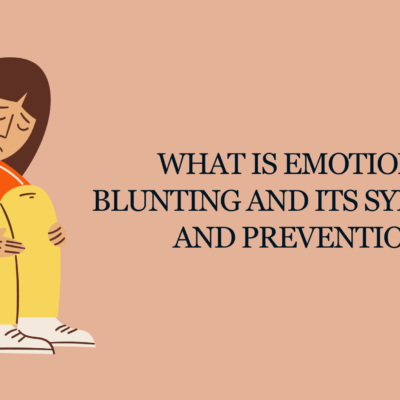What is Emotional Blunting and its Symptoms and Prevention: Emotional well-being plays an important role in our overall health, affecting our relationships, work, and everyday life. Emotional blunting is a phenomenon that affects a person’s capability to experience and express emotions. This condition can have powerful effects on mental health and interpersonal relationships.
In this article, we will talk about what emotional blunting is, its symptoms, and what are the prevention strategies to overcome it.
Also Read:
- What are Social Phobia Causes and its Prevention?
- How to Heal Myself from Emotional Trauma?
- Gardening Benefits for Mental Health.
- Ways to Break Your Bad Mood. (in 15 minutes)
- Signs You are a Positive Thinker.
What is Emotional Blunting?
Emotional blunting means a decrease or impairment in the intensity of emotional experiences. It means a decrease in the capacity to express emotions, both verbally and non-verbally. It can affect our different emotions, including joy, sadness, anger, and fear, leading to a general sense of emotional numbness.
Causes of Emotional Blunting
Many factors contribute to the development of emotional blunting, and they can differ from person to person. Some of such common causes include:
Medications
Certain medications, especially those that are used to treat psychiatric disorders like depression or anxiety, can cause emotional blunting as a side effect. Antidepressants are an example of medications that may affect our response emotionally.
Substance abuse
The use of inappropriate substances can greatly affect emotional functioning. Chronic substance abuse can lead to desensitization of the brain’s reward system, contributing to emotional blunting.
Trauma
People who have experienced traumatic events may develop emotional blunting as a coping tool to protect themselves from overwhelming emotions. This can be a subconscious reaction to avoid reliving distressing memories.
Neurological conditions
Certain neurological disorders or injuries to the brain can impact emotional processing and expression, leading to emotional blunting. Conditions such as traumatic brain injury or specific neurodegenerative diseases may contribute to these symptoms.
Symptoms of Emotional Blunting
Identifying the symptoms of emotional blunting is important for early intervention and support. The following are common signs that may signify the presence of emotional blunting:
Decreased emotional expression
People with emotional blunting may struggle to express their feelings. Facial expressions, tone of voice, and body language may seem limited or less than usual.
Difficulty experiencing pleasure
The inability to experience pleasure is a common symptom of emotional blunting. Activities that once brought joy or satisfaction may no longer produce the same emotional reaction.
Inadequate empathy
Emotional blunting can affect a person’s ability to understand and empathize with the emotions of others. This can strain relationships, as the affected person may seem indifferent to the feelings of those around them.
Shifts in emotional memory
Emotional blunting can affect how people recall and process emotional memories. The emotional content of memories may be distorted, affecting the way people connect with past experiences.
Prevention Strategies for Emotional Blunting
Managing emotional blunting includes handling its underlying causes and executing strategies to promote emotional well-being. Here are some useful prevention strategies:
Medication Management
If emotional blunting is a side effect of medication, it is important to communicate openly with healthcare professionals. They can change the dosage or explore alternative medications that may have fewer effects on emotional responsiveness.
Psychotherapy
Engaging in psychotherapy, such as cognitive-behavioral therapy (CBT) or dialectical behavior therapy (DBT), can help people explore and understand the emotional parts of their experiences. Therapists can provide coping strategies and support in navigating challenging emotions.
Practice Mindfulness Meditation
Practices like mindfulness meditation can improve emotional awareness and regulation. These techniques enable people to stay present in the moment, promoting a deeper connection with their emotions.
Substance Abuse Treatment
For those experiencing emotional blunting due to substance abuse, seeking treatment for addiction is necessary. Rehabilitation programs and counseling can handle the root causes of substance abuse and support people in rebuilding emotional well-being.
Trauma-Informed Care
People who have experienced trauma may benefit from trauma-informed care. This approach acknowledges the effect of trauma on emotional well-being and highlights creating a safe and supportive environment for recovery.
Physical Exercise
Regular physical activity is proven to have positive effects on mood and emotional well-being. Exercise releases endorphins, which are natural mood enhancers, and promote overall mental health.
Build Strong Social Support
Building and maintaining a strong social group can provide emotional support and a sense of belonging. Trusted friends, family, or support groups can play an important role in helping people navigate challenging emotions.
Healthy Lifestyle Choices
Adopting a healthy lifestyle, including balanced nutrition, sufficient sleep, and stress management helps in maintaining overall emotional well-being. These factors can positively affect mood and decrease the risk of emotional blunting.
At The End
Emotional blunting is a complicated phenomenon with different reasons, varying from medication side effects to psychological trauma. Identifying the symptoms early on and understanding the underlying factors are important steps in handling emotional blunting.
I hope this article will be helpful for you in the journey of recognizing and dealing with the signs of emotional blunting.








